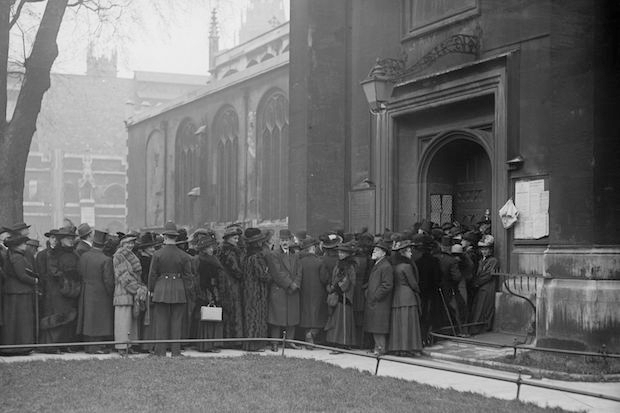From ‘Latent Creeds’, The Spectator, 5 June 1915:
Has it not sometimes occurred to habitual church-goers to think how intensely interesting it would be if, when the congregation turned to the east, each man, instead of repeating after the choir, proclaimed aloud the creed of his soul? It would not perhaps be a bad spiritual exercise if each man made an effort to do so inwardly. We think many men might draw therefrom some measure of consolation, for the creed of the soul is not always the creed of the intellect; it is usually simpler and more satisfactory. The intellect is fearfully liable to the miasmatic influences of pessimism. It is almost impossible to maintain a state of optimism by reliance upon the mind alone. Life by all calculations is a tragedy. Yet as the mind argues this in how many souls there echoes an obverse platitude, one of which the mind is utterly impatient, but by which the spirit lives—”It is all for the best.” Simple people often any it because they often repeat aloud the creed of their souls, though nowadays they seem to have lost interest in any ecclesiastical “form of sound words.”
One asks oneself sometimes: “Is the soul of the modern Englishman, apart from his reason and apart from his temptations, naturally Christian?” It has of course often been maintained that it is. Natural Christian souls are not un-common, and Christianity does seem to make an appeal, not strong enough always to affect conduct or subdue doubts to the great majority of those one knows, who are after all the world —for us. The present writer’s experience would, lead him to suppose, in spite of the vaunted scepticism and fashionable materialism of the day, that Christianity makes a far more universal appeal on its spiritual and supernatural than on its moral side. To many a man who believes with his mind and soul that the dead live Christian morality is almost repugnant; and to many more who believe in their souls, however much they doubt in their minds, that a world of the spirit does exist where men do not see death, the Sermon an the Mount is of the nature of childishness. It is not about morals that the soul is very sure and here again the Christian Church when she drew up her creeds showed that she knew her children.






Comments